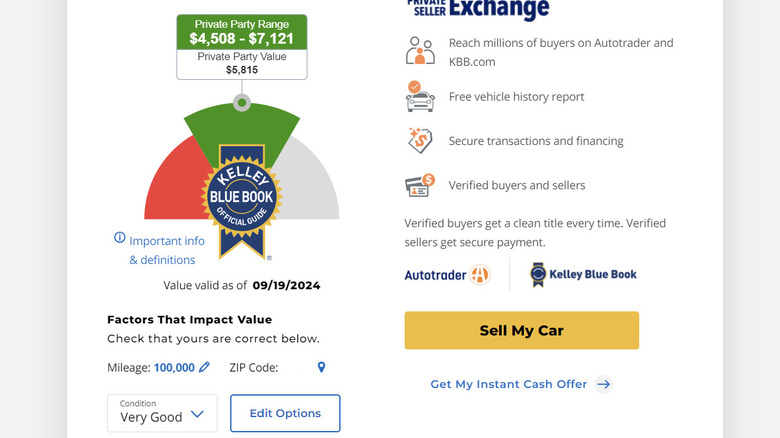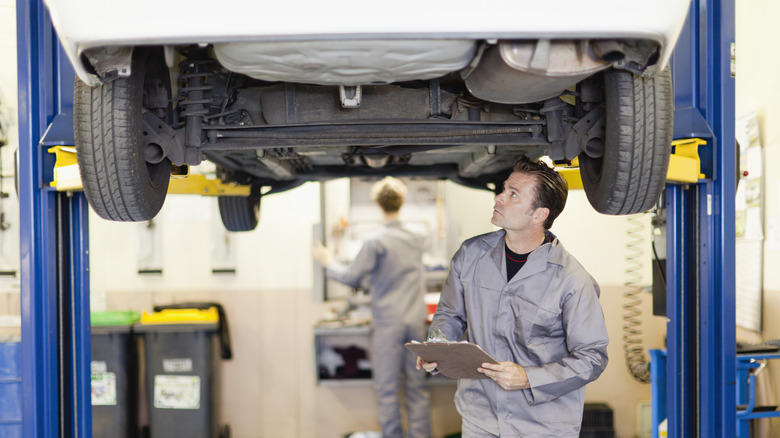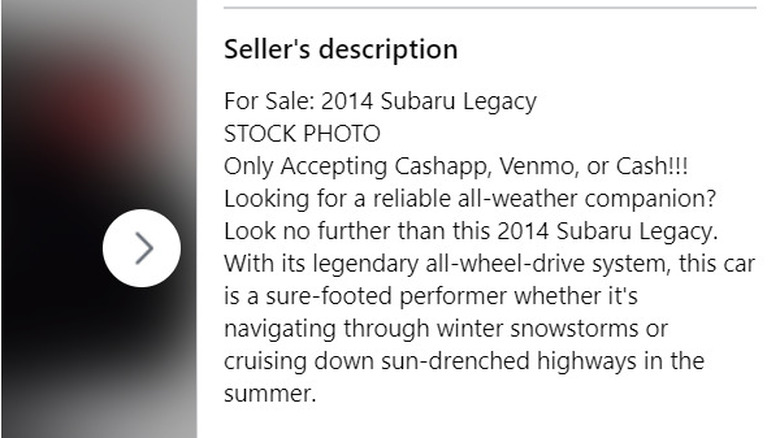4 Tips For Buying A Car From Facebook Marketplace
It's no secret that buying a new car is expensive, not to mention all the hidden costs that go along with it. This alone means buying a used car a worthwhile option. While it's unlikely you will get a factory warranty, there are cost savings to be had, such as lower monthly payments and insurance premiums. While you could jump from dealership to dealership, why not take a look at Facebook Marketplace?
It may seem sketchy if you've never done it, and to be honest, there is a lot you need to know about buying from Facebook Marketplace, but believe it or not, it's worth checking out. Not only can you avoid dealing with multiple salespeople and trying to get more for your trade-in vehicle, but you can find some great deals. There are several sellers who are willing to cut ties with their vehicle for several reasons, whether that be they are moving, need quick cash, or simply don't need the vehicle any longer.
Before diving into the marketplace, there are important things you need to look out for when buying a used car. From checking book values to avoiding scams, here are vital tips for buying a car from Facebook Marketplace.
Check used car values
Once you have selected a few vehicles you're interested in, it's always a good idea to check the car values. While you can find great deals on Facebook Marketplace, there are also many sellers looking to get more than their vehicle is worth. Before scheduling a meeting with the seller, you can get a ballpark idea using the year, model, make, trim, year, region, and mileage of the vehicle. Head over to KBB and J.D. Power to get started and take a look at the private book values.
When looking at the values, you will notice that KBB and J.D. Power will typically give a range within $2,000 to $3,000. This is because the condition of the vehicle plays a big part. For example, KBB will show condition based on four categories: fair, good, very good, and excellent. Again, this is just a rough estimate as pictures from the seller can be deceiving, and the listing may only give you so much to work with. Nonetheless, this gives you a starting point so when you do go see the car in person, whether it's beat up or in great condition, you know where to begin negotiations.
One thing to be aware of is that some sellers will list their vehicle higher than the recommended book value because of recent repairs. Repairs do not make the vehicle worth more than the max book value. For example, if the excellent book value from KBB is $10,000 and the seller did $2,000 of repairs, that does not mean the car is worth $12,000 — a vehicle in excellent condition is still worth $10,000. Not to mention, if you need a loan from the bank, the lender will also not take that into consideration when valuing the vehicle.
Schedule a meeting for a test drive
Once you have found a vehicle you are interested in and have pulled book values, it is time to schedule a meeting for a test drive. Doing a test drive is of the utmost importance when deciding whether to buy a vehicle from a private seller. Not only can you look at the exterior and interior of the vehicle with your own eyes, but it also gives you a chance to see if the vehicle has any mechanical problems.
Before getting on the road, check the tire tread, look under the hood to see if there is anything out of the ordinary, make sure the heat and A/C work, turn on the radio, and double-check any other features. There is nothing worse than buying a vehicle only to realize that something doesn't work that the seller didn't mention.
Ask the seller if you can take your time testing the vehicle, so you have a chance to get up to speed on the interstate or highway. This way, you can see if there is any rattling or other strange noises coming from the vehicle. When you finish with the test drive, this is a good time to ask any questions you might have and see if they have maintenance or repair records.
Take it to a mechanic for inspection and do a VIN check
This next step can be done either during your initial test drive or after, but it should be done before handing over any money: Ask the seller if they are comfortable with a mechanic doing a quick inspection on the vehicle. Many shops offer an inspection that takes 30 minutes to an hour to see if there are any major mechanical issues with the vehicle.
While it will cost you to do this — around $150 — it's better than buying a vehicle that ends up being a money pit. For example, just brake replacements can cost $300 to $800 and while you might not notice a problem on a 20-minute test drive, a mechanic can tell you if it needs to be done soon. This can save you a headache from buying a polished turd.
During this time, run a VIN check. A VIN check will tell you the vehicle's history and highlight any major red flags. Things to watch out for are accidents and their severity, title issues, reported thefts, mileage rollbacks, or open recalls. None of these should be taken lightly and should be looked into further before doing any negotiations.
VIN checks will also report any maintenance records performed by a dealer, how many owners there were, and where the vehicle was registered from each owner. These are all important insights, and you can do a VIN check on reputable sites like Carfax. Not doing a VIN check is one of the biggest mistakes to avoid when buying a classic or used car.
Watch for car selling scams on Facebook Marketplace
Unfortunately, whether you are looking for a new job or shopping for products online, scams are everywhere these days and shopping for a car on Facebook Marketplace is no different. You have to be extra careful in this situation because vehicles are not cheap, and your personal information is invaluable. One of the most common red flags is a too good to be true listing price.
If you have done your research on ballpark car values, and you see a listing for a vehicle that looks impeccable in the pictures but is priced astronomically low, then avoid it like the plague. More than likely, it is a phishing attempt and the person behind the scenes is looking to collect personal information or worse, trying to find a way to have you send them money. Other common red flags to watch out for are listings that have little to no information, vague seller profiles, selling on behalf of someone else, or website links in the description that take you outside of Facebook.
Even if you have what seems like a trustworthy conversation with the seller, never send a deposit to hold the vehicle or give any of your personal information. Lastly, if you are at the point where you have gone through the above steps, but the seller does not have the title in hand or says it's "lost" or "waiting on a new one from the state," walk away. Do not exchange money until after the title is signed in front of a notary by you and the owner of the vehicle.




